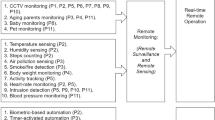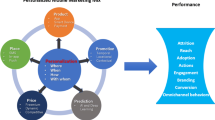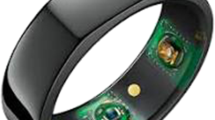Abstract
Context-aware applications stemming from diverse fields like mobile health, recommender systems, and mobile commerce potentially benefit from knowing aspects of the user’s personality. As filling out personality questionnaires is tedious, we propose the prediction of the user’s personality from smartphone sensor and usage data. In order to collect data for researching the relationship between smartphone data and personality, we developed the Android app track your daily routine (TYDR), which tracks and records smartphone data and utilizes psychometric personality questionnaires. With TYDR, we track a larger variety of smartphone data than many other existing apps, including metadata on notifications, photos taken, and music played back by the user. Based on the development of TYDR, we introduce a general context data model consisting of four categories that focus on the user’s different types of interactions with the smartphone: physical conditions and activity, device status and usage, core functions usage, and app usage. On top of this, we developed the Privacy Model for Mobile Data Collection Applications (PM-MoDaC) specifically tailored for apps that are related to the collection of mobile data, consisting of nine proposed privacy measures. We present the implementation of all of those measures in TYDR. Our experimental evaluation is based on data collected with TYDR during a two-month period. We find evidence that our users accept our proposed privacy model. Based on data about granting TYDR all or no Android system permissions, we find evidence that younger users tend to be less willing to share their data (average age of 30 years compared to 35 years). We also observe that female users tend to be less willing to share data compared to male users. We did not find any evidence that education or personality traits are a factor related to data sharing. TYDR users score higher on the personality trait openness to experience than the average of the population, which we assume to be evidence that the type of app influences the user base it attracts in terms of average personality traits.



Similar content being viewed by others
Notes
We consider DS2 instead of DS1 here, as DS1 contains several users that probably never used or intended to use the app; see Note on DS1 above.
References
Beierle F (2018) Do You Like What I Like? Similarity estimation in proximity-based mobile social networks. In: Proc. 2018 17th IEEE international conference on trust, security and privacy in computing and communications (TrustCom). IEEE, pp 1040–1047. https://doi.org/10.1109/TrustCom/BigDataSE.2018.00146
Beierle F, Göndör S, Küpper A (2015) Towards a three-tiered social graph in decentralized online social networks. In: Proc. 7th international workshop on hot topics in planet-scale mobile computing and online social networking (HotPOST). ACM, New York, pp 1–6. https://doi.org/10.1145/2757513.2757517
Beierle F, Grunert K, Göndör S, Küpper A (2016) Privacy-aware social music playlist generation. In: Proc. 2016 IEEE international conference on communications (ICC). IEEE, pp 5650–5656. https://doi.org/10.1109/ICC.2016.7511602
Beierle F, Grunert K, Göndör S, Schlüter V (2017) Towards psychometrics-based friend recommendations in social networking services. In: 2017 IEEE international conference on AI & mobile services (AIMS). IEEE, pp 105–108. https://doi.org/10.1109/AIMS.2017.22
Beierle F, Tran VT, Allemand M, Neff P, Schlee W, Probst T, Pryss R, Zimmermann J (2018a) Context data categories and privacy model for mobile data collection apps. Procedia Comput Sci 134:18–25. https://doi.org/10.1016/j.procs.2018.07.139
Beierle F, Tran VT, Allemand M, Neff P, Schlee W, Probst T, Pryss R, Zimmermann J (2018b) TYDR—track your daily routine. Android app for tracking smartphone sensor and usage data. In: 2018 ACM/IEEE 5th international conference on mobile software engineering and systems (MOBILESoft ’18). ACM, New York, pp 72–75. https://doi.org/10.1145/3197231.3197235
Bogomolov A, Lepri B, Ferron M, Pianesi F, Pentland AS (2014) Daily stress recognition from mobile phone data, weather conditions and individual traits. In: Proc. 22nd ACM international conference on multimedia, MM ’14. ACM, New York, pp 477–486. https://doi.org/10.1145/2647868.2654933
Butt S, Phillips JG (2008) Personality and self reported mobile phone use. Comput Human Behav 24(2):346–360. https://doi.org/10.1016/j.chb.2007.01.019
Canzian L, Musolesi M (2015) Trajectories of depression: unobtrusive monitoring of depressive states by means of smartphone mobility traces analysis. In: Proc. of the 2015 ACM international joint conference on pervasive and ubiquitous computing (UbiComp). ACM, UbiComp ’15, pp 1293–1304. https://doi.org/10.1145/2750858.2805845
Carneiro D, Pinheiro AP, Novais P (2017) Context acquisition in auditory emotional recognition studies. J Ambient Intell Humaniz Comput 8(2):191–203. https://doi.org/10.1007/s12652-016-0391-2
Chittaranjan G, Blom J, Gatica-Perez D (2011) Who’s who with big-five: analyzing and classifying personality traits with smartphones. In: Proc. 2011 15th annual international symposium on wearable computers. IEEE, pp 29–36. https://doi.org/10.1109/ISWC.2011.29
Chittaranjan G, Blom J, Gatica-Perez D (2013) Mining large-scale smartphone data for personality studies. Personal Ubiquitous Comput 17(3):433–450. https://doi.org/10.1007/s00779-011-0490-1
Chorley MJ, Whitaker RM, Allen SM (2015) Personality and location-based social networks. Comput Human Behav 46(Supplement C):45–56. https://doi.org/10.1016/j.chb.2014.12.038
Danner D, Rammstedt B, Bluemke M, Treiber L, Berres S, Soto C, John O (2016) Die deutsche Version des Big Five Inventory 2 (BFI-2). In: Zusammenstellung Sozialwissenschaftlicher Items und Skalen. https://doi.org/10.6102/zis247
de Montjoye YA, Quoidbach J, Robic F, Pentland A (2013) Predicting personality using novel mobile phone-based metrics. In: SBP. Springer, New York, pp 48–55. https://doi.org/10.1007/978-3-642-37210-0_6
Dey AK (2001) Understanding and using context. Personal Ubiquitous Comput 5(1):4–7. https://doi.org/10.1007/s007790170019
Di Matteo D, Fine A, Fotinos K, Rose J, Katzman M (2018) Patient willingness to consent to mobile phone data collection for mental health apps: structured questionnaire. JMIR Ment Health. https://doi.org/10.2196/mental.9539
Ferreira D, Kostakos V, Dey AK (2015) AWARE: mobile context instrumentation framework. Front ICT. https://doi.org/10.3389/fict.2015.00006
Fleeson W (2001) Toward a structure-and process-integrated view of personality: traits as density distributions of states. J Personal Soc Psychol 80(6):1011–1027. https://doi.org/10.1037/0022-3514.80.6.1011
Fuentes C, Herskovic V, Rodríguez I, Gerea C, Marques M, Rossel PO (2017) A systematic literature review about technologies for self-reporting emotional information. J Ambient Intell Humaniz Comput 8(4):593–606. https://doi.org/10.1007/s12652-016-0430-z
Grover T, Mark G (2017) Digital footprints: predicting personality from temporal patterns of technology use. In: Proc. 2017 ACM Intl. joint conference on pervasive and ubiquitous computing and proc. 2017 ACM Intl. symposium on wearable computers. ACM, UbiComp ’17, pp 41–44. https://doi.org/10.1145/3123024.3123139
Harari GM, Lane ND, Wang R, Crosier BS, Campbell AT, Gosling SD (2016) Using smartphones to collect behavioral data in psychological science: opportunities, practical considerations, and challenges. Perspect Psychol Sci 11(6):838–854. https://doi.org/10.1177/1745691616650285
Harari GM, Müller SR, Aung MS, Rentfrow PJ (2017) Smartphone sensing methods for studying behavior in everyday life. Curr Opin Behav Sci 18(Supplement C):83–90. https://doi.org/10.1016/j.cobeha.2017.07.018
Hinds J, Joinson A (2019) Human and computer personality prediction from digital footprints. Curr Dir Psychol Sci 28(2):204–211. https://doi.org/10.1177/0963721419827849
Jayarajah , Balan RK, Radhakrishnan M, Misra A, Lee Y (2016) LiveLabs: building in-situ mobile sensing & behavioural experimentation TestBeds. In: Proc. 14th annual international conference on mobile systems, applications, and services. ACM, MobiSys ’16, pp 1–15. https://doi.org/10.1145/2906388.2906400
Karumur RP, Nguyen TT, Konstan JA (2017) Personality, user preferences and behavior in recommender systems. Inf Syst Front. https://doi.org/10.1007/s10796-017-9800-0
Kim SY, Koo HJ, Song HY (2018) A study on estimation of human personality from location visiting preference. J Ambient Intell Humaniz Comput 9(3):629–642. https://doi.org/10.1007/s12652-017-0459-7
Kiukkonen N, Blom J, Dousse O, Gatica-Perez D, Laurila J (2010) Towards rich mobile phone datasets: Lausanne data collection campaign. In: Proceedings of the ACM International Conference on Pervasive Services (ICPS)
Li Y, Zhao Y, Ishak S, Song H, Wang N, Yao N (2018) An anonymous data reporting strategy with ensuring incentives for mobile crowd-sensing. J Ambient Intell Humaniz Comput 9(6):2093–2107. https://doi.org/10.1007/s12652-017-0529-x
LiKamWa R, Liu Y, Lane ND, Zhong L (2013) MoodScope: building a mood sensor from smartphone usage patterns. In: Proc. 11th annual international conference on mobile systems, applications, and services. ACM, MobiSys ’13, pp 389–402. https://doi.org/10.1145/2462456.2464449
López G, Marín G, Calderón M (2017) Human aspects of ubiquitous computing: a study addressing willingness to use it and privacy issues. J Ambient Intell Humaniz Comput 8(4):497–511. https://doi.org/10.1007/s12652-016-0438-4
Matz SC, Kosinski M, Nave G, Stillwell DJ (2017) Psychological targeting as an effective approach to digital mass persuasion. Proc Natl Acad Sci 114(48):12714–12719. https://doi.org/10.1073/pnas.1710966114
McCrae RR, John OP (1992) An introduction to the five-factor model and its applications. J Personal 60(2):175–215
Mohr DC, Zhang M, Schueller SM (2017) Personal sensing: understanding mental health using ubiquitous sensors and machine learning. Ann Rev Clin Psychol 13:23–47. https://doi.org/10.1146/annurev-clinpsy-032816-044949
Myers SD, Sen S, Alexandrov A (2010) The moderating effect of personality traits on attitudes toward advertisements: a contingency framework. Manag Mark 5(3):3–20
Pryss R, Reichert M, Langguth B, Schlee W (2015) Mobile crowd sensing services for tinnitus assessment, therapy, and research. In: 2015 IEEE international conference on mobile services (MS). IEEE, pp 352–359. https://doi.org/10.1109/MobServ.2015.55
Pryss R, Probst T, Schlee W, Schobel J, Langguth B, Neff P, Spiliopoulou M, Reichert M (2018) Prospective crowdsensing versus retrospective ratings of tinnitus variability and tinnitus–stress associations based on the TrackYourTinnitus mobile platform. Int J Data Sci Anal. https://doi.org/10.1007/s41060-018-0111-4
Rachuri KK, Musolesi M, Mascolo C, Rentfrow PJ, Longworth C, Aucinas A (2010) EmotionSense: a mobile phones based adaptive platform for experimental social psychology research. In: Proc. 12th ACM Intl. conference on ubiquitous computing (UbiComp). ACM, UbiComp ’10, pp 281–290. https://doi.org/10.1145/1864349.1864393
Roche MJ, Pincus AL, Rebar AL, Conroy DE, Ram N (2014) Enriching psychological assessment using a person-specific analysis of interpersonal processes in daily life. Assessment 21(5):515–528. https://doi.org/10.1177/1073191114540320
Sariyska R, Rathner EM, Baumeister H, Montag C (2018) Feasibility of linking molecular genetic markers to real-world social network size tracked on smartphones. Front Neurosci. https://doi.org/10.3389/fnins.2018.00945
Soto CJ, John OP (2017) The next big five inventory (BFI-2): developing and assessing a ierarchical model with 15 facets to enhance bandwidth, fidelity, and predictive power. J Personal Soc Psychol 113(1):117–143. https://doi.org/10.1037/pspp0000096
Stachl C, Hilbert S, Au JQ, Buschek D, De Luca A, Bischl B, Hussmann H, Bühner M (2017) Personality traits predict smartphone usage. Eur J Personal 31(6):701–722. https://doi.org/10.1002/per.2113
Wang R, Chen F, Chen Z, Li T, Harari G, Tignor S, Zhou X, Ben-Zeev D, Campbell AT (2014) StudentLife: assessing mental health, academic performance and behavioral trends of college students using smartphones. In: Proc. 2014 ACM international joint conference on pervasive and ubiquitous computing (UbiComp). ACM, UbiComp ’14, pp 3–14. https://doi.org/10.1145/2632048.2632054
Wang R, Harari G, Hao P, Zhou X, Campbell AT (2015) SmartGPA: how smartphones can assess and predict academic performance of college students. In: Proc. 2015 ACM international joint conference on pervasive and ubiquitous computing (UbiComp). ACM, pp 295–306. https://doi.org/10.1145/2750858.2804251
Wang R, Chen F, Chen Z, Li T, Harari G, Tignor S, Zhou X, Ben-Zeev D, Campbell AT (2017) StudentLife: using smartphones to assess mental health and academic performance of college students. In: Mobile health. Springer, New York, pp 7–33. https://doi.org/10.1007/978-3-319-51394-2_2
Xiong H, Huang Y, Barnes LE, Gerber MS (2016) Sensus: a cross-platform, general-purpose system for mobile crowdsensing in human-subject studies. In: Proc. 2016 ACM international joint conference on pervasive and ubiquitous computing (UbiComp). ACM, UbiComp ’16, pp 415–426. https://doi.org/10.1145/2971648.2971711
Xu R, Frey RM, Fleisch E, Ilic A (2016) Understanding the impact of personality traits on mobile app adoption–insights from a large-scale field study. Comput Human Behav 62(Supplement C):244–256. https://doi.org/10.1016/j.chb.2016.04.011
Yurur O, Liu C, Sheng Z, Leung V, Moreno W, Leung K (2014) Context-awareness for mobile sensing: a survey and future directions. IEEE Commun Surv Tutor 18(1):1–28. https://doi.org/10.1109/COMST.2014.2381246
Zhou T, Lu Y (2011) The effects of personality traits on user acceptance of mobile commerce. Int J Human Comput Interact 27(6):545–561. https://doi.org/10.1080/10447318.2011.555298
Zimmermann J, Woods WC, Ritter S, Happel M, Masuhr O, Jaeger U, Spitzer C, Wright AGC (2019) Integrating structure and dynamics in personality assessment: first steps toward the development and validation of a personality dynamics diary. Psychol Assess 31(4):516–531. https://doi.org/10.1037/pas0000625
Acknowledgements
We are grateful for the support provided by Daniel Lenz, Sakshi Bansal, Marcel Müller, Soumya Siladitya Mishra, and Sarjo Das. We also thank all TYDR users.
Author information
Authors and Affiliations
Corresponding author
Additional information
Publisher's Note
Springer Nature remains neutral with regard to jurisdictional claims in published maps and institutional affiliations.
This work was done in the context of project DYNAMIC (http://www.dynamic-project.de) (grant No 01IS12056), which is funded as part of the Software Campus initiative by the German Federal Ministry of Education and Research (BMBF)
Rights and permissions
About this article
Cite this article
Beierle, F., Tran, V.T., Allemand, M. et al. What data are smartphone users willing to share with researchers?. J Ambient Intell Human Comput 11, 2277–2289 (2020). https://doi.org/10.1007/s12652-019-01355-6
Received:
Accepted:
Published:
Issue Date:
DOI: https://doi.org/10.1007/s12652-019-01355-6




